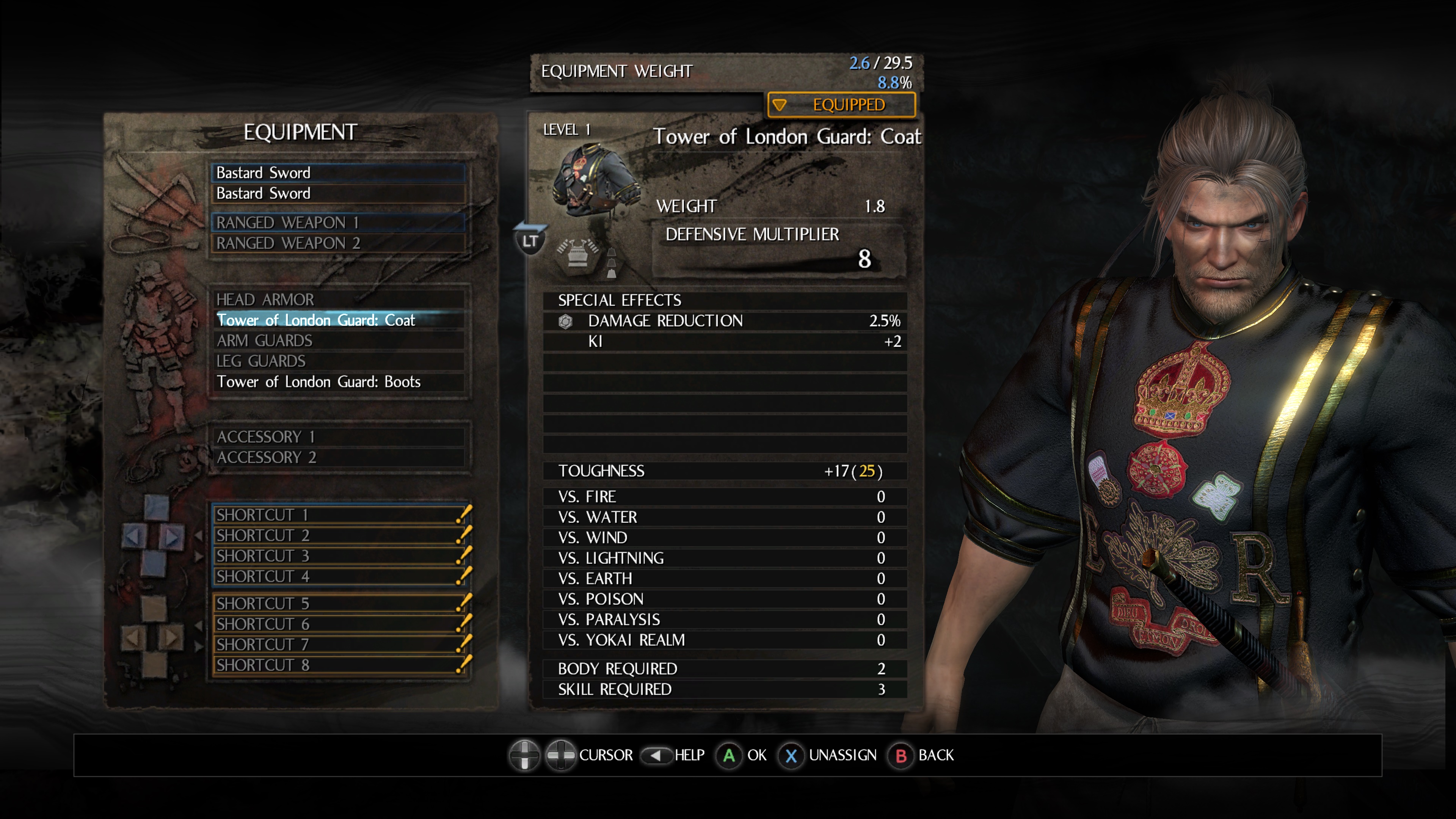
Structure is more traditional in Nioh, as the game is played out with missions selected on a world map, with each one being a self contained stage with an objective (kill or find something), reminiscent of Demon’s Souls, but without the central hub. There is a very useful item called the Summoner’s Candle that will call your spirit back to the shrine while keeping all the lost amrita, a wonderful thing if you happen to die with over 100,000 amrita in hand before using them to level up William’s various stats. The spirit returns to the player back at the shrine when dying before claiming the dropped amirta, losing a double dose of the stuff unless you decide to call the guardian spirit back to you, a function available at the shrine, but this destroys the grave and any amrita residing in it. Nioh is even more limiting in regards to how it handles death, as if you die before returning to your grave to claim amrita, not only do you lose those, but you also lose the ones currently gained, since it’s related to the guardian spirit, and the lack of one means you do not drop amirta on death. Dying sends the player back to the last activated shrine, but with all your amirta dropped and access to an equipped guardian spirit gone – an animal being that provides passive bonuses and an ultimate attack – until returning to the grave where you met your demise to collect them. Shrines act as the game’s bonfires, respawning enemies when using them to save. It plays into the death, reborn, find my amirta (souls) before dying again cycle that manages to get people hooked on these types of games. Death is one thing that will be familiar for Souls fans, and unless you are a master of combat and reactions, such a thing will not be avoided, as Nioh is unquestionably a challenging game. You only need to spend an hour or two with Nioh to clearly notice which mechanics are lifted straight from the Souls series, but even then, there are enough differences that keeps it engrossing. I always enjoy stories that twist historical figures and events with a fictional story, and Nioh does it well, blending in plenty of Japanese mythology into a plot that has enough to be enjoyable without over-forcing the story in the way of gameplay. Some how, William became an Irishman in his move to a video game, who is hunting down an enemy known as Edward Kelly in Japan, while England and Spain are in battle over a mythical resource called amrita (found in Japan), hoping the material will give their side an advantage in the Anglo-Spanish conflict.

There are some changes to the factual events that took place, since the story behind Nioh is one based on supernatural elements.

The protagonist in Nioh is William Adams, who is loosely based off the English sailor from the 1600s that arrived in Japan after 19 months at sea and became one of the few western people be given the authority of a samurai.

Nioh tells its Sengoku era story in a more traditional way, filled with cutscenes and dialogue, unlike the vague story that one passively learns when playing the Souls games.
#Why is it nioh complete edition Pc
I never managed to give the game a go on PS4, but after playing the PC version, I am surprised at how well the developers have managed to make a game that takes bits of Dark Souls, but twist it to make it its own thing, to the point that I feel this is the first game that truly rivals the Dark Souls series at its own game.

Earlier in the year, Koei Tecmo and Team Ninja released Nioh for what seem to be a PlayStation 4 exclusive, due to the huge market focus from Sony for the game, but just recently it was announced for PC and released a few weeks after with a subtitle the Complete Edition featuring the main game and all the DLC included.
#Why is it nioh complete edition code
No matter if it is 2D or 3D, titles like Lords of the Fallen, Salt and Sanctuary, Titan Souls, and The Surge(with more games to come, such as Code Vein), have all taken bits of From Software’s popular series and tried to replicate elements, but I feel they never quite managed to capture what made Dark Souls so good. There is no doubt – even though it is technically the second entry in From Software’s Souls games – that Dark Souls has inspired a sort of sub-genre for action RPGs that other developers are inspired by.


 0 kommentar(er)
0 kommentar(er)
